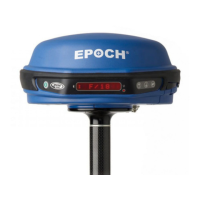EPOCH 50 GNSS System User Guide 23
General Operation 3
31.2 Charging and storing batteries
All battery types discharge over time when they are not being used. Batteries also
discharge faster in colder temperatures. If a Lithium-ion battery is to be stored for long
periods of time, make sure it is fully charged before storing and re-charged at least once
every three months.
C
WARNING – Charge and use the rechargeable Lithium-ion battery only in strict
accordance with the instructions. Charging or using the battery in unauthorized
equipment can cause an explosion or fire, and can result in personal injury and/or
equipment damage.
To prevent injury or damage:
– Do not charge or use the battery if it appears to be damaged or leaking.
– Charge the Lithium-ion battery only with a product that is specified to charge it. Be sure
to follow all instructions that are provided with the battery charger.
– Discontinue charging a battery that gives off extreme heat or a burning odor.
– Use the battery only in equipment that is specified to use it.
– Use the battery only for its intended use and according to the instructions in the product
documentation.
C
WARNING – Avoid contact with the rechargeable Lithium-ion battery if it appears to be
leaking. Battery fluid is corrosive, and contact with it can result in personal injury and/or
property damage.
To prevent injury or damage:
– If the battery leaks, avoid contact with the battery fluid.
– If battery fluid gets into your eyes, immediately rinse your eyes with clean water and
seek medical attention. Do not rub your eyes!
– If battery fluid gets onto your skin or clothing, immediately use clean water to wash off
the battery fluid.

